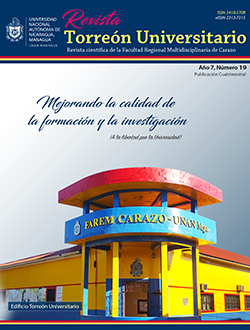Las ciencias cognitivas: preámbulo para comprender el funcionamiento de los esquemas del ser humano
DOI:
https://doi.org/10.5377/torreon.v7i19.7908Palabras clave:
ciencias cognitivas, autopoiesis, plasticidad cerebral, neuronas espejo, memoria, holograma nerviosoResumen
Varias generaciones de estudios de las ciencias cognitivas, han dado como resultado una amplia cantidad de teorías. En estas, se abordan diferentes aspectos del sistema que permiten al ser humano funcionar en diferentes ambientes. Esto es posible, porque el sistema cerebral es plástico (adaptable), se reestructura a sí mismo en una escala de la realidad, imperceptible para los sentidos humanos. A la par de esta cualidad, existen otras que codifican información. Ese es el caso del sistema neuronal espejo que codifica las intenciones de los demás, lo que permite entendernos. Los esquemas de aprendizaje se pueden estructurar, considerando el modelo holográfico de la mente, que expone la manera cómo la conciencia se distribuye por todo el sistema cerebral y funciona como un mecanismo de recuperación de información desde las diferentes áreas. Estos sistemas tienen como producto lo que en neurociencia se denomina memoria, la que es individual y colectiva. Finalmente, el lenguaje sustenta estas capacidades mentales y permite la manifestación comunicativa de los esquemas, a través de la interacción con los demás.
Descargas
Descargas
Publicado
Número
Sección
Licencia
The authors who publish in this journal agree to the following terms.
- The author or authors of the articles, essays or research grant the National Autonomous University of Nicaragua, Managua (UNAN-Managua) the editing rights (copyright) of the submitted work, therefore the University has the exclusive right to publish the article for the entire copyright period.
- These copyrights/authors authorize Torreón Universitario Magazine and the University to edit and disseminate/publish the article in said Magazine, including printed and electronic reproduction, storage, retrieval and any other type of publication, and sources of secondary information as services. of summaries and databases, they also empower it to protect the article against unauthorized use for dissemination by printed or electronic media (PDF, HTML, EPUB, XML or others).
License for use of content
The magazine uses the Creative Commons Attribution-NonCommercial-NoDerivs 4.0 International License.
Under this statement:

This journal is licensed under a Creative Commons Attribution-NonCommercial-NoDerivatives 4.0 International License. It can be copied, distributed and transmitted publicly as long as the author and source are cited (Revista Torreón Universitario), it should not be modified or used for any commercial purpose. The full license can be found at http://creativecommons.org/licenses/by-nc-nd/4.0/.



